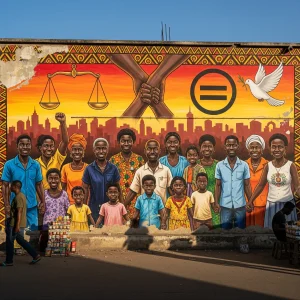Faith in Action for Social Justice in the United Kingdom
The Religious Society of Friends, widely known as the Quakers, has a long and deeply rooted tradition of social justice activism in the United Kingdom and beyond. Guided by the principle that every human being carries “that of God,” Quakers have historically championed causes from the abolition of slavery, prison reform, and peace-building to contemporary issues of economic inequality and welfare. One area where Quaker advocacy has been especially pronounced in recent years is in relation to social security reform—specifically, the implementation and impact of Universal Credit.
Background: Universal Credit in the UK
Universal Credit is a welfare benefit introduced in the United Kingdom in 2013, intended to streamline and simplify the benefits system by merging six means-tested benefits and tax credits into a single monthly payment. The stated aims are to encourage work, reduce poverty, and make the system fairer and easier to navigate. However, Universal Credit has attracted both praise and controversy since its inception, with concerns raised about delays in payments, increased hardship for vulnerable groups, and the overall reduction in income support for some claimants.
Quaker Values and Social Welfare
Central to Quaker beliefs is the testimony of equality. This leads Friends to support measures that help ensure all members of society have access to basic necessities and opportunities to flourish. Quakers advocate a society in which no one is left behind, marginalized, or forced into poverty by systemic structures. Their approach to welfare reform is therefore shaped by compassion, solidarity, and the desire to work collaboratively for transformational change.
Quaker Advocacy: Principles and Practice
Quaker advocacy around Universal Credit has generally manifested in three key ways: political lobbying, public witness, and community support.
Political Lobbying and Engagement
Quakers in Britain, through their representative body Quakers in Britain, have regularly engaged with policymakers to influence the development, implementation, and reform of Universal Credit. This has included:
- Submitting evidence and recommendations to parliamentary committees and government consultations.
- Meeting with MPs and civil servants to raise concerns about issues such as the five-week waiting period, sanctions, and the impact on disabled people.
- Working in coalition with other faith groups, charities, and non-profit organizations to amplify voices calling for change.
The advocacy is informed by direct experience from Quaker communities, many of which have witnessed first-hand the effects of welfare reform on individuals and families. Friends have been particularly vocal about the need for a safety net that is both dignified and sufficient, urging the government to revise aspects of Universal Credit that perpetuate hardship.
Public Witness and Awareness-Raising
Quakers have also participated in public actions to draw attention to the lived realities of those affected by Universal Credit. This includes:
- Organizing vigils, public meetings, and forums to share stories and foster dialogue.
- Producing and distributing educational materials on Universal Credit and its impact.
- Supporting national campaigns like “End Hunger UK” and “Keep the Lifeline,” which called for the uplift of Universal Credit during the COVID-19 pandemic.
Quaker witness often takes the form of peaceful protest, art installations, and social media advocacy, centering the voices of those directly affected by welfare changes.
Community Support and Direct Action
On the ground, Quaker meetings and groups frequently provide practical support to those navigating the Universal Credit system. This can include:
- Offering advice and signposting to local resources or benefit advisors.
- Running food banks, debt support groups, and community lunches.
- Partnering with organizations like Citizens Advice to ensure claimants understand their rights.
Friends see this service not simply as charity, but as an expression of justice—walking alongside those in need and challenging the structures that perpetuate inequality.
Challenges and Concerns Raised by Quakers
While recognizing the intention to simplify welfare, Quakers have repeatedly highlighted several problematic aspects of Universal Credit:
- The Five-Week Wait: The initial waiting period for receiving Universal Credit payments has been described as a systemic cause of debt, evictions, and food insecurity.
- Sanctions and Conditionality: The punitive approach to non-compliance, often leading to suspension of payments, has been criticized as undermining claimant dignity and worsening hardship.
- Digital Exclusivity: Universal Credit is primarily accessed online, excluding those without reliable internet access or digital literacy.
- Impact on Vulnerable Groups: Disabled people, single parents, and those with mental health conditions have reportedly suffered a disproportionate impact under the new system.
Quaker advocacy often centers on these issues, calling for reforms such as reducing the waiting period, softening sanctions, increasing the basic rate of payment, and improving accessibility.
Collaboration and Collective Action
Quakers rarely act alone. Their advocacy is embedded in a wider network of organizations including churches, secular charities, and campaign groups. Through forums such as Churches Together in Britain and Ireland, the Joint Public Issues Team, and End Hunger UK, Quakers strengthen their impact by working in coalition—organizing petitions, lobbying, and mobilizing grassroots support.
Case Studies: Quaker Action in Local Communities
In cities like Manchester, Birmingham, and Bristol, Quaker groups have documented the effects of Universal Credit rollout on local populations. Meetings have hosted workshops on navigating the digital process, provided emergency grants, and even joined legal challenges to policies deemed unjust. These local actions often feed into national advocacy, creating a feedback loop between lived experience and policy development.
Looking Forward: Quaker Vision for Welfare Reform
Ultimately, Quaker advocacy strives for a welfare system that reflects the inherent worth of each person. Friends envision reforms that eradicate poverty, prioritize well-being, and encourage a culture of solidarity. Their commitment to Universal Credit is not to its current form, but to the ideals it could embody with genuine reform—universal access, adequate support, and respect for dignity.
Conclusion
Quaker advocacy for the implementation of Universal Credit is rooted in centuries of faith-driven activism and a deep concern for social justice. Friends continue to stand alongside marginalized groups, challenging policymakers, and fostering community resilience. As debates over welfare reform persist, Quakers remain a vital voice for compassion, dignity, and equality—a reminder that true social security is not merely a policy, but a moral imperative.


